Dubai Real Estate Investment: A Comprehensive Guide to Tapping into its Golden Potential
Estimated reading time: 18 minutes
Key Takeaways
- Dubai real estate investment offers high profitability potential, supported by a stable economy and outstanding tax incentives like exemption from personal income tax and rental yield tax.
- The investment process requires thorough market research, selecting the appropriate property type, collaborating with a reputable agent, understanding legal procedures, and careful financial planning.
- Areas like Downtown Dubai, Dubai Marina, Palm Jumeirah, Business Bay, and Jumeirah Village Circle (JVC) offer diverse investment opportunities with unique characteristics and potential.
- Key factors to consider include location, potential for capital appreciation, rental feasibility, developer reputation, and infrastructure development plans.
- Identifying and mitigating risks from market fluctuations, legal changes, and project delays is crucial for successful investment.
Table of Contents
- The Appeal of Dubai Real Estate Investment and the Potential of UAE Real Estate Investment
- Outstanding Benefits of Dubai Real Estate Investment
- Important Steps for Investing in Dubai Real Estate
- Attractive Areas for Dubai Real Estate Investment
- Key Factors to Consider When Investing in Dubai Real Estate
- Risks and How to Mitigate Them When Investing in Dubai Real Estate
- Frequently Asked Questions (FAQ) about Dubai Real Estate Investment
- Conclusion: Seizing the Golden Opportunity from Dubai Real Estate Investment
The Appeal of Dubai Real Estate Investment and the Potential of UAE Real Estate Investment
Dubai real estate investment is increasingly establishing its position as a prominent trend, attracting strong interest not only in the Middle East region but also globally. Exceptional economic growth, attractive profitability potential, and a friendly investment environment have transformed Dubai into a magnet for international investors. It’s no coincidence that Dubai is often referred to as the “land of opportunities“, where open policies and a diverse real estate market welcome investors from around the world, including Vietnam.
The appeal of Dubai’s real estate market comes not only from iconic skyscrapers or luxurious projects but also from a solid economic foundation and the government’s strategic vision. With its position as a leading financial, tourism, and commercial hub, Dubai offers stability and sustainable development potential for investments. The potential of UAE real estate investment in general, and Dubai in particular, is strengthened by factors such as modern infrastructure, high quality of life, and a diverse international community.
This article will provide a comprehensive overview of the real estate investment landscape in Dubai. We will together explore outstanding benefits, detailed investment processes, the most attractive real estate areas, important factors to consider, potential risks, and effective strategies to mitigate them. Whether you are a seasoned investor or just starting to explore, the information below will be a valuable guide to help you make informed decisions and achieve success in this potentially rich market.
Outstanding Benefits of Dubai Real Estate Investment
Investing in the Dubai real estate market brings many attractive benefits, making it a priority destination for global investors. From high profitability potential to tax incentives and diversity in options, Dubai truly unlocks valuable opportunities.
- High profitability potential from Dubai real estate:
One of the most attractive factors when investing in Dubai real estate is its impressive profitability potential. Although the market has gone through various development stages, and the pace of price increase may no longer be as explosive as in earlier golden years, experts still offer positive assessments. For example, some analyses show that even if the record price increase momentum in Dubai real estate shows signs of slowing compared to previous years, the market still projects an average growth forecast of around 8% for the residential segment in 2025. This figure still outperforms many major cities and developed markets worldwide like London or New York, indicating the sustainable appeal of Dubai real estate. This potential comes not only from capital appreciation but also from attractive rental yields, especially in central and high-demand areas.
- Dubai’s economy is stable and continuously growing:
Dubai is not just a tourist hotspot but also a major financial, commercial, and logistics center in the Middle East and globally. Dubai’s economy has demonstrated stability and strong resilience through global fluctuations. The Dubai government is continuously committed to sustainable development, constantly expanding large-scale infrastructure projects and diversifying the economy. Strong investment in technology, innovation, and future industries like artificial intelligence and blockchain further strengthens Dubai’s position. A strong and growing economy creates stable demand for residential and commercial properties, thereby supporting real estate values.
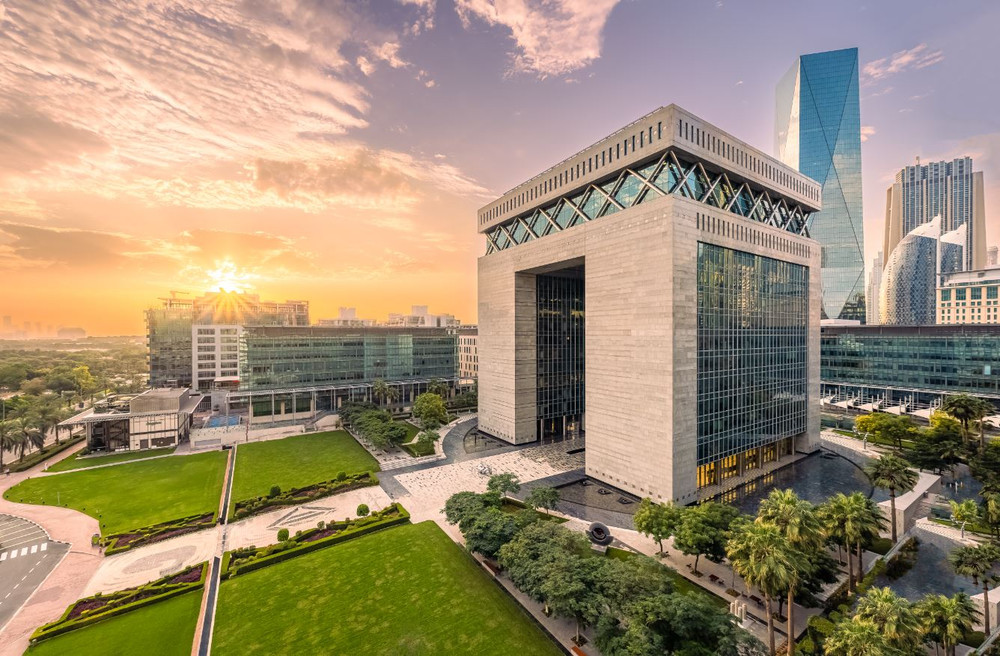
Dubai Financial Center
- Outstanding tax incentives for real estate investors:
This is one of Dubai’s biggest competitive advantages. Investors in real estate here benefit from extremely favorable tax policies. Most notably, Dubai exempts personal income tax and tax on rental income from real estate. This means that all profits generated from selling or renting a property (after deducting related expenses) will belong to the investor without the burden of income tax. This policy provides clear financial benefits, especially attractive to foreign investors seeking to maximize their profits.
- Diverse real estate options to meet every need:
The Dubai real estate market is extremely diverse, offering a rich portfolio of property types to suit every investment goal and budget. From modern studio apartments in skyscrapers, luxury apartments with spectacular views, opulent villas by the sea or in golf communities, to commercial properties like offices, retail stores in prime locations, or even world-class resort projects. This diversity allows investors to choose the product best suited to their strategy, whether for living, long-term rental, short-term rental like Airbnb, or waiting for capital appreciation. “Off-plan” projects (buying property under construction) are also a popular choice, often coming with flexible payment plans and potential price increases upon completion.
These benefits, combined with a safe, modern, and multicultural living environment, make Dubai real estate investment a smart strategic decision for investors looking to diversify their portfolio and seek superior growth opportunities.
Important Steps for Investing in Dubai Real Estate: Understanding Property Purchase Procedures in Dubai and Legal Notes When Investing in Arab Real Estate
Investing in a foreign market like Dubai requires careful preparation and understanding of the process. Below are the basic steps and legal notes when investing in Arab real estate that investors need to grasp to ensure a safe and effective transaction.
- Market research, grasp current trends:
This is the fundamental and most important step. Before investing capital, investors need to spend time thoroughly researching the Dubai real estate market. This includes:
- Clearly define investment goals: Do you want to buy for personal use, long-term rental, short-term rental, or flipping for profit from price difference? Your goal will determine the appropriate property type and location.
- Analyze market trends: Monitor price fluctuations, rental yield rates in different areas, current supply and demand.
- Update information on potential development areas: Dubai constantly has new infrastructure projects and master plans. Grasping areas planned for strong development can provide an advantage.
- Understand macro factors: Economic policies, interest rates, major events (like Expo) can impact the market.
- Choose the property type suitable for the strategy:
The Dubai market offers many options. Choosing the right property type is key to success:
- Residential: Apartments, villas, townhouses. Suitable for living or rental purposes.
- Commercial: Offices, retail spaces, warehouses. Often provide stable rental yield but require larger capital investment and in-depth market knowledge.
- Off-plan projects: This involves buying property that is under construction or even just on the drawing board. Off-plan projects often have more attractive prices and flexible payment plans, but also come with risks regarding completion time or design changes.
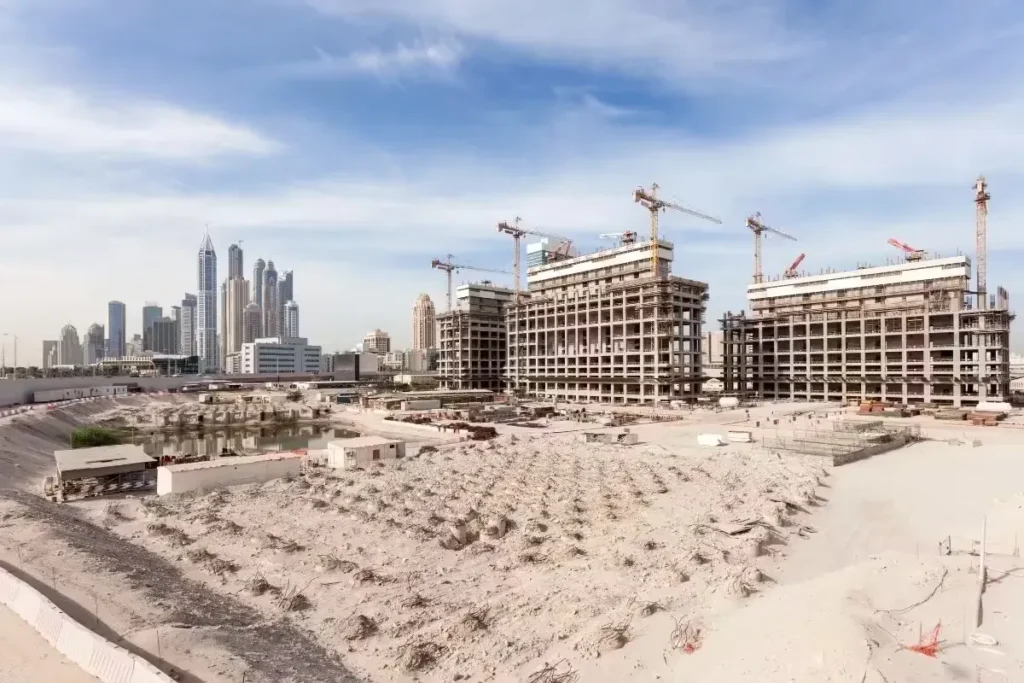
Off-plan property Dubai
- Plots: Buy land to build yourself or wait for price appreciation. Requires understanding master plans and building permits.
- Work with a reputable real estate agent/broker:
For foreign investors, collaborating with a reputable real estate company or professional broker in Dubai is extremely important. They not only help you find suitable property but also assist with legal procedures and negotiations. Ensure that:
- The broker has a valid license from the Dubai Real Estate Regulatory Agency (RERA).
- They have experience and deep knowledge of the area you are interested in.
- They have a good reputation and receive positive feedback from previous clients.
- Thoroughly research legal requirements and regulations:
Property purchase procedures in Dubai for foreigners have specific regulations. It is crucial to fully comply with legal procedures:
- Freehold and Leasehold Areas: Foreigners are generally allowed to own property perpetually (freehold) in designated areas. Some other areas may be leasehold for up to 99 years.
- Transaction Registration: All real estate transactions must be registered with the Dubai Land Department (DLD).
- Sale and Purchase Agreement (SPA): This is an important legal document that should be carefully reviewed by a lawyer or legal consultant.
- No Objection Certificate (NOC): Required from the developer to transfer ownership.
- Arrange finances and choose a payment method:
Financial resources and payment plans need to be ready:
- Own capital: Clearly define your maximum budget.
- Bank loan: Some banks in Dubai offer home loans to foreigners, but terms and loan-to-value ratios may vary.
- Developer payment plans: Many projects, especially off-plan ones, often have flexible installment payment plans spread over several years. Carefully consider your personal financial capacity before committing.
- Related costs: Besides the purchase price, consider other costs such as DLD registration fees (typically 4% of the property value), brokerage fees, building management fees, annual service charges.
By following these steps and paying close attention to the legal notes when investing in Arab real estate, investors can feel more confident in their journey to own property in Dubai. Seeking advice from experienced legal and financial professionals locally is always encouraged.
Attractive Areas for Dubai Real Estate Investment
Dubai boasts many areas with unique characteristics and potential, suitable for different investment goals. Choosing the right “gem” among countless options is a key factor to maximize returns from Dubai Real Estate Investment.
-
Downtown Dubai: The heart of luxury and vibrancy
Characteristics: The premier commercial, tourism, and entertainment center of Dubai. It gathers global icons like the world’s tallest building, Burj Khalifa, and the giant Dubai Mall.
Property Type: Primarily luxury apartments, high-end hotels, and some Grade A offices.
Investment Appeal: Unbeatable location, attracting tourists and the elite. Very high potential for short-term (Airbnb) and long-term rentals. Property values here consistently remain high and have good liquidity. Suitable for investors seeking prestige and stable rental income.
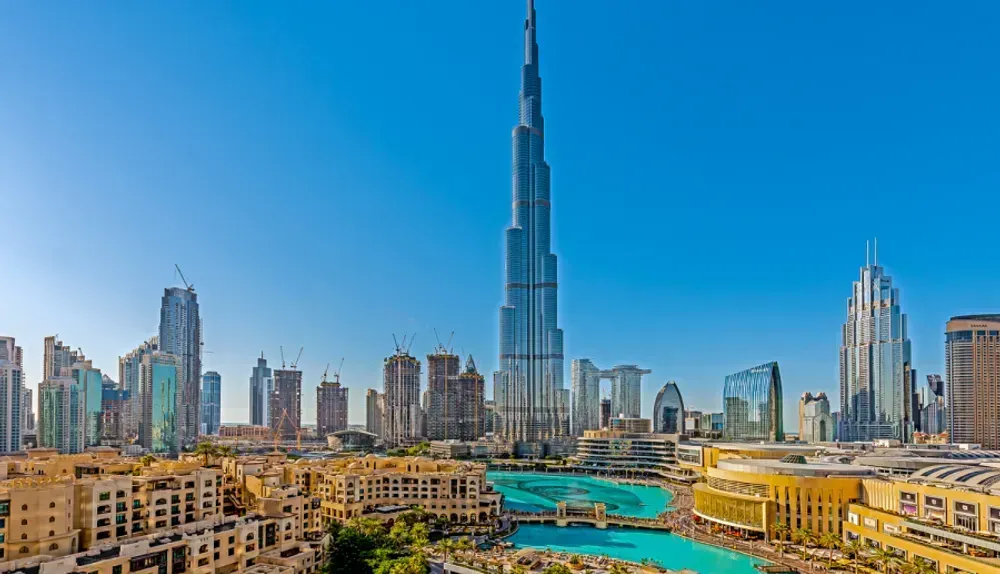
Downtown Dubai
-
Dubai Marina: Modern and dynamic coastal living
Characteristics: One of the world’s largest artificial marinas, surrounded by modern residential towers, restaurants, cafes, and a bustling waterfront promenade (Marina Walk).
Property Type: Diverse apartments from studios to penthouses, many buildings offering stunning sea or marina views.
Investment Appeal: Resort-style living combined with urban conveniences. Highly popular among expatriates and young families. Rental demand is consistently high, offering good rental yields. Amenities like Dubai Marina Mall and nearby JBR beach add to the attraction.
-
Palm Jumeirah: An icon of luxury and uniqueness
Characteristics: The world-famous artificial palm-shaped archipelago, a marvel of modern engineering.
Property Type: Focused on ultra-luxury waterfront villas (Signature Villas, Garden Homes), premium apartments in towers along the trunk (e.g., Shoreline Apartments), and 5-star hotels, world-class resorts.
Investment Appeal: Global brand, attracting the ultra-rich and celebrities. Property values are among the highest in Dubai. Significant capital appreciation potential and ability to rent out resort villas at high prices. Owning property here is a statement of prestige.
-
Business Bay: Dynamic financial and business center
Characteristics: Located next to Downtown Dubai, planned to be Dubai’s central business district (CBD), similar to Manhattan in New York or Ginza in Tokyo. The Dubai Water Canal flows through, enhancing the scenic beauty.
Property Type: Primarily modern office towers, serviced apartments, and some business hotels.
Investment Appeal: Strategic location for businesses, attracting multinational companies to set up offices. High demand for office rentals and apartments for professionals working here. Large development potential as the area continues to complete its infrastructure. Suitable for commercial real estate investment or rental apartments targeting business people.
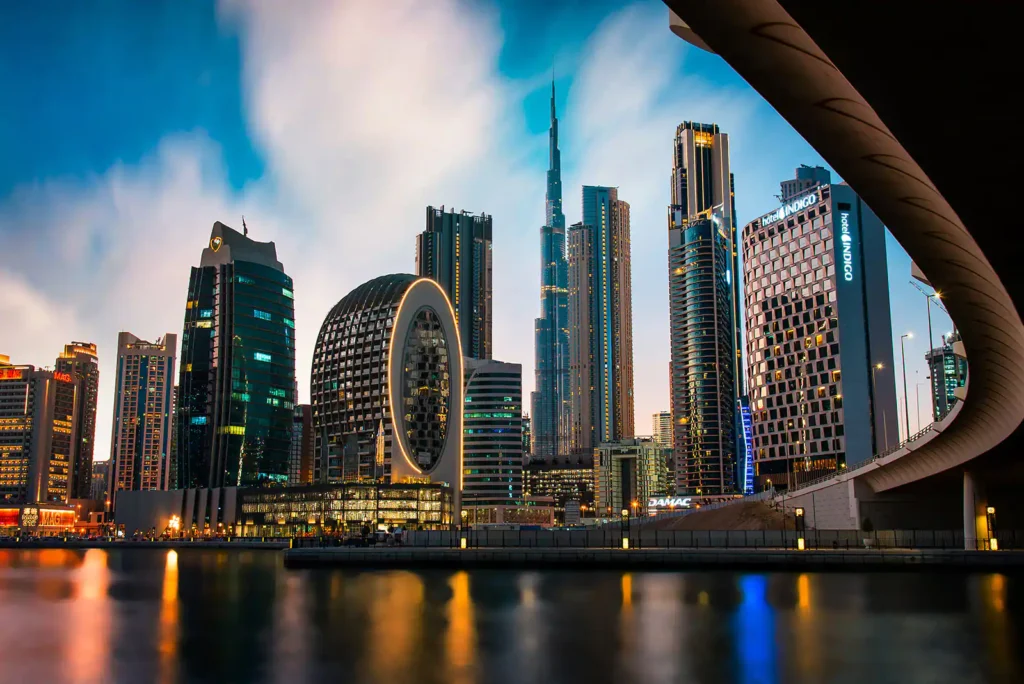
Business Bay Dubai
-
Jumeirah Village Circle (JVC): Fast-growing residential community with affordable prices
Characteristics: A rapidly developing residential area, offering a quiet, family-friendly living environment with many parks and green spaces.
Property Type: Diverse, from studios, 1-3 bedroom apartments to townhouses and some smaller villas.
Investment Appeal: More affordable prices compared to central areas, attracting young families and first-time homebuyers. Good capital appreciation potential as infrastructure and amenities are increasingly completed. Stable rental yield due to consistently high demand for reasonably priced housing. JVC is gradually becoming one of the popular choices for investors seeking both cash flow and capital growth.
Furthermore, there are many other potential areas like Dubai Hills Estate (luxury golf community), Emaar Beachfront (waterfront apartments with private beach), Arabian Ranches (traditional desert-style villa community), each offering its own advantages. The choice of area depends on the risk appetite, budget, and long-term investment goals of each individual when participating in the Dubai Real Estate Investment market.
Key Factors to Consider When Investing in Dubai Real Estate to unlock UAE Real Estate Investment Potential
To ensure that Dubai Real Estate Investment is optimally effective and fully exploits the potential of UAE real estate investment, investors need to carefully analyze many factors. This is not just about choosing a beautiful home, but a strategic financial decision.
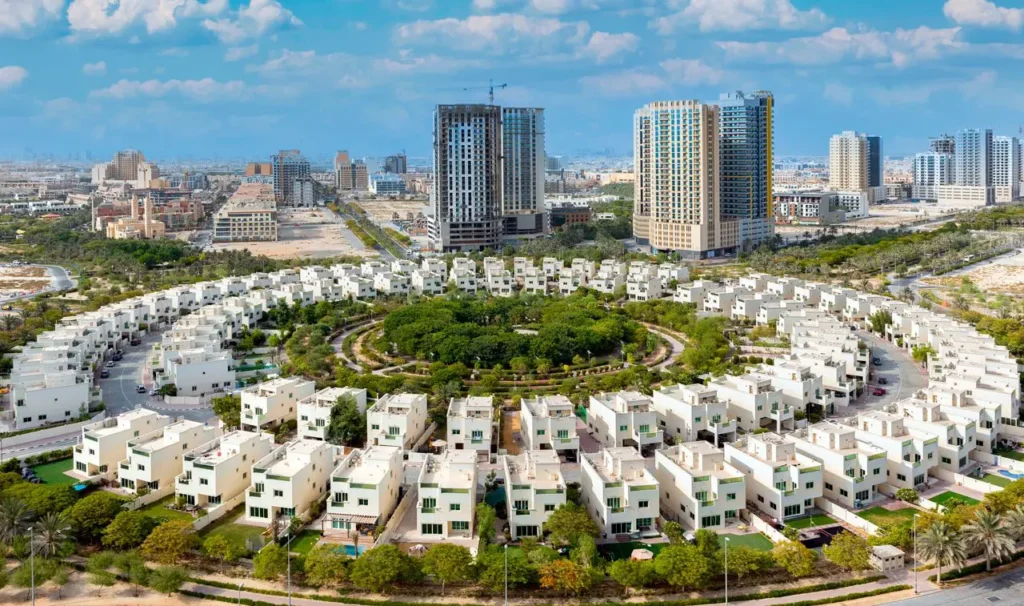
- Location and convenient transportation connectivity:
“Location, location, location” – this mantra is always true in real estate. A prime location determines not only current value but also future appreciation potential.
- Access to amenities: Close to schools, hospitals, shopping centers, entertainment areas.
- Transportation connectivity: Easy access to business centers, the airport, major routes, metro stations.
- Surrounding environment: Security, landscape, green spaces, residential community.
A property in a good location will be easier to rent out or resell at a higher price.
- Property type and outstanding capital appreciation potential:
Each property type (apartment, villa, office, retail) has different characteristics and capital appreciation potential.
- Market demand: Which type is in high demand and limited supply?
- Uniqueness: Projects with unique designs, superior amenities, or located in special master-planned areas often have better appreciation potential.
- Construction quality: Materials, design, and construction standards affect the durability and long-term value of the asset.
Investors should choose a property type that aligns with their goal (e.g., small apartments are easy to rent, villas are suitable for families or high-end rentals).
- Rental feasibility and current market demand:
For investors aiming to generate cash flow, rental yield is an extremely important factor.
- Rental yield rate: Calculate the ratio of annual rental income to property value. Compare between different areas and property types.
- Rental demand: Is the area densely populated, with many expatriates or tourists? Stable rental demand ensures high occupancy rates.
- Competitive rental rates: Research rental prices for similar properties in the area.
A property with good rental potential and attractive yield will provide a stable source of passive income.
- Developer reputation and on-time project completion commitment:
This is a key factor, especially when investing in off-plan projects (buying property under construction).
- Track record: Has the developer had experience developing similar projects? Were previous projects completed on time and met the committed quality?
- Financial capacity: Does the developer have sufficient financial resources to complete the project, even if the market fluctuates?
- Market feedback: Find out reviews from previous clients who bought properties from that developer.
- Future infrastructure development plans in the surrounding area:
Government or major developer infrastructure development plans can significantly impact property values in the area.
- Transportation infrastructure projects: New roads, metro line extensions, overpasses.
- Public amenities: International schools, hospitals, parks, cultural centers.
- Major commercial projects: New shopping malls, office complexes, hotels.
Staying informed about future development projects helps investors anticipate appreciation opportunities. An area that is planned to have more amenities or better connectivity will often see an increase in property value.
Carefully considering these factors will help investors make informed decisions, minimize risks, and maximize profits when participating in the Dubai Real Estate Investment market, an important part of the potential of UAE real estate investment.
Risks and How to Mitigate Them When Investing in Dubai Real Estate: Legal Notes When Investing in Arab Real Estate
Although the Dubai Real Estate Investment market offers many attractive opportunities, investors also need to identify and have strategies to deal with potential risks. Understanding the challenges and preparing preventive measures is crucial to protect your investment, while also needing to grasp the legal notes when investing in Arab real estate.
- Market fluctuations and macroeconomic factors:
- Risk: Property prices, like any market, can go through cycles of growth, stability, or decline. Global economic factors, oil prices, monetary policy, or even local oversupply can cause property prices to slow down or decrease in the short term. Rental yields can also fluctuate with supply and demand.
- Mitigation:
- Long-term investment: Real estate is often a long-term investment. Avoid short-term flipping unless you truly understand the market.
- Portfolio diversification: Do not “put all your eggs in one basket”. If possible, diversify your investments into different property types (apartments, villas, commercial) and in different areas.
- Thorough research: Closely follow economic indicators, market reports, and forecasts from reputable organizations.
- Changes in laws, policies, and regulations:
- Risk: The government can change regulations related to property ownership, taxes, fees, or visa policies for investors. These changes can affect the rights and costs of investors.
- Mitigation:
- Stay updated: Follow official announcements from the Dubai Land Department (DLD) and relevant government agencies.
- Legal consultation: Work with lawyers or legal consultants experienced in Dubai to understand current regulations and potential changes.
- Be flexible: Prepare for possible adjustments and have a response plan.
- Risk of project delays or even cancellation:
- Risk: This is especially concerning for off-plan projects (buying property under construction). Developers may face financial difficulties, licensing issues, or other objective factors leading to project stagnation or inability to complete.
- Mitigation:
- Choose a reputable developer: Prioritize projects by large, reputable developers with a good track record of completing projects on time and strong financial capacity. Carefully check their portfolio and completed projects.
- Check the Escrow Account: Ensure that your payments are deposited into an escrow account approved by RERA. This helps protect the buyer’s rights in case the project faces problems.
- Carefully review the Sale and Purchase Agreement (SPA): The contract should have clear clauses regarding progress, handover quality, and remedies if the developer breaches the agreement.
General strategies for effective risk mitigation:
In addition to specific measures for each type of risk, some general strategies can help investors feel more secure:
- Conduct thorough Due Diligence: This step is non-negotiable. Before making any decision, conduct your own or hire a professional to assess every aspect of the property, developer, and related legal factors.
- Work with trusted professionals: Collaborate with reputable and experienced real estate agents, lawyers, and financial consultants in the Dubai market. They can provide valuable advice and support you throughout the process.
- Understand the target market: If investing for rental income, thoroughly research potential tenants, their needs, and reasonable rental rates.
- Do not invest beyond your financial capacity: Ensure you have sufficient resources to cover initial costs as well as ongoing costs of property ownership and operation.
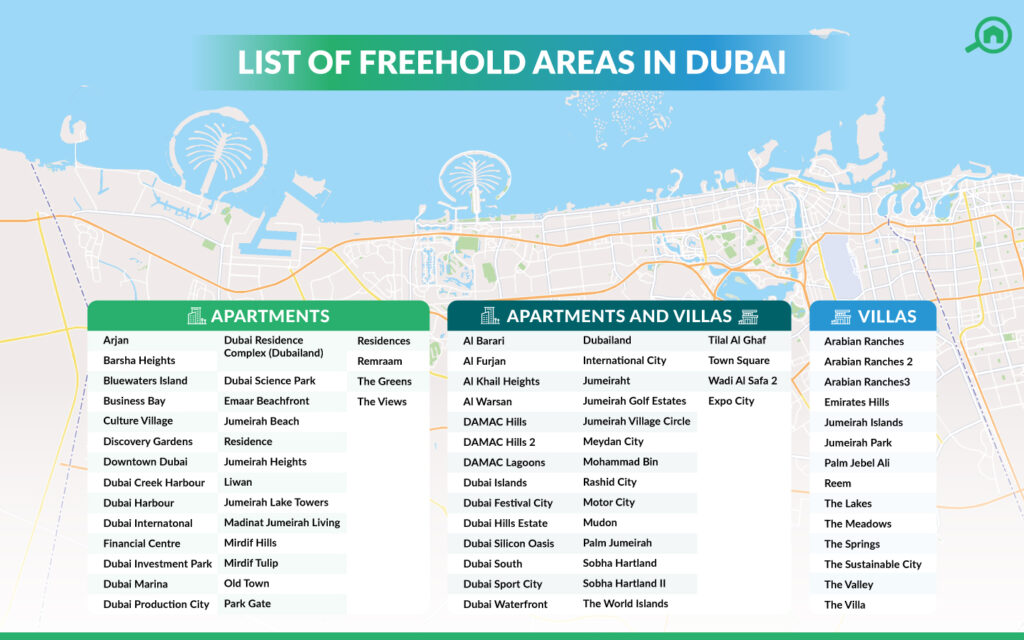
Designated freehold areas
By proactively identifying and applying risk mitigation measures, investors can feel more confident when participating in the Dubai Real Estate Investment market, while always paying attention to the legal notes when investing in Arab real estate to ensure a successful and sustainable investment journey.
Frequently Asked Questions (FAQ) about Dubai Real Estate Investment: Answering Property Purchase Procedures in Dubai and common queries
1. Can foreigners buy and own property in Dubai?
Answer: Yes. Dubai has a very open policy towards foreign investors. The Dubai government allows foreigners (non-UAE or GCC citizens) to buy and own property perpetually (freehold ownership) in specifically designated areas (designated freehold areas). These areas include many famous locations such as Downtown Dubai, Dubai Marina, Palm Jumeirah, Jumeirah Lakes Towers (JLT), Jumeirah Village Circle (JVC), Business Bay, and many other areas. Additionally, there is also leasehold ownership for up to 99 years.
2. What is the minimum investment amount to buy property in Dubai?
Answer: The minimum investment amount depends heavily on the property type, location, size, and project status (new or resale, off-plan or ready). Typically, a studio or one-bedroom apartment in developing areas or further from the center can start from around 400,000 – 500,000 AED (equivalent to over 100,000 USD). For higher-end apartments in central locations like Downtown Dubai or Dubai Marina, prices can start from several hundred thousand USD upwards. Villas and penthouses will be significantly more expensive. Off-plan projects sometimes have more attractive starting prices and flexible payment plans.
3. How long does a real estate transaction in Dubai typically take?
Answer: The time to complete a real estate transaction in Dubai can vary depending on several factors, including the property type (off-plan or completed), whether the buyer needs a mortgage, and the cooperation between parties.
- For completed properties paid in cash, the transaction can be completed within 30 days, sometimes faster (around 2-4 weeks) if all paperwork goes smoothly.
- If the buyer needs bank financing, the process can take longer, usually from 4 to 8 weeks, as the bank needs time to assess the loan application and appraise the property.
- For off-plan properties, the initial registration process with the developer is usually quick, but the handover and completion of ownership will depend on the project’s construction progress.
4. Besides the purchase price, what maintenance costs do property owners in Dubai need to pay?
Answer: Owning property in Dubai comes with several recurring maintenance costs that owners need to be aware of:
- Service Charges: This is an annual fee that owners must pay for the maintenance of common areas and building or community amenities (e.g., swimming pool, gym, security, landscaping, cleaning). This fee varies depending on the project, location, and amenities provided.
- Property Management Fees: If you rent out your property and use the services of a management company, you will have to pay them a fee (usually a percentage of the collected rent).
- Utilities: Including electricity, water (provided by DEWA – Dubai Electricity and Water Authority), and cooling fees (if there is a central cooling system).
- Home Insurance: Although not always mandatory (except when obtaining a mortgage), buying insurance for the property and contents is a wise precaution.
- Transfer Fees: Although this is a one-time cost during purchase/sale (usually 4% of the property value, shared between buyer and seller or borne entirely by the buyer depending on agreement), it needs to be considered when calculating total investment costs.
There is no annual property tax like in many other countries, but service charges are a significant expense that needs to be factored in.
Understanding these questions and answers will help investors feel more confident in researching and executing Dubai Real Estate Investment, as well as better preparing for the Property Purchase Procedures in Dubai.
Conclusion: Seizing the Golden Opportunity from Dubai Real Estate Investment and the Potential of UAE Real Estate Investment
Through detailed analysis, it can be affirmed that Dubai Real Estate Investment truly opens up countless attractive opportunities for global investors. With high profitability potential, an increasingly open and transparent legal environment, and diversity in property options from modern apartments, luxurious villas to bustling commercial projects, Dubai meets the needs of various investor groups, from individuals seeking a second home, investors looking for stable rental income, to large organizations wanting to expand their international investment portfolio. The potential of UAE real estate investment in general, with Dubai leading the way, remains very large.
Success in this field requires careful preparation, strategic vision, and prudence. Investors need to proactively conduct extensive research on the market, from grasping the latest trends, analyzing the characteristics of each area, to evaluating the developer’s reputation and project quality. Choosing quality projects from reputable developers, collaborating with professional and locally knowledgeable consulting partners are key factors.
Most importantly, proactive risk management will be the key to ensuring long-term investment effectiveness. Always stay updated with information, conduct thorough due diligence before making decisions, and diversify your investment portfolio to minimize the impact of unforeseen market fluctuations.
Do not hesitate to begin your investment journey in one of the world’s most dynamic and developed cities. Equip yourself with solid knowledge, seek support from reliable sources of information and reputable international real estate consultants. With thorough preparation and a smart strategy, Dubai Real Estate Investment can certainly bring outstanding results and contribute to your financial prosperity in the future.

